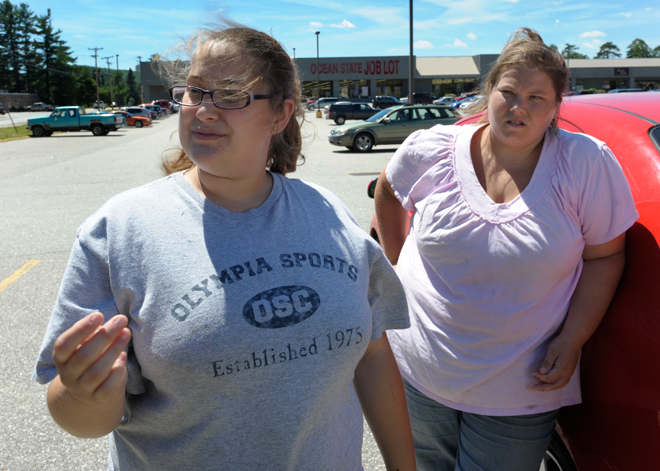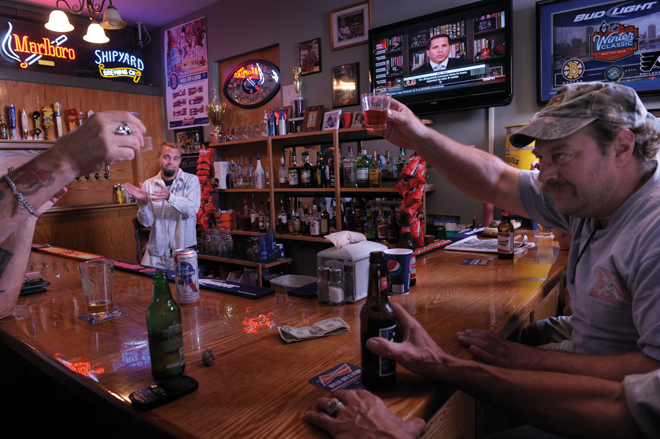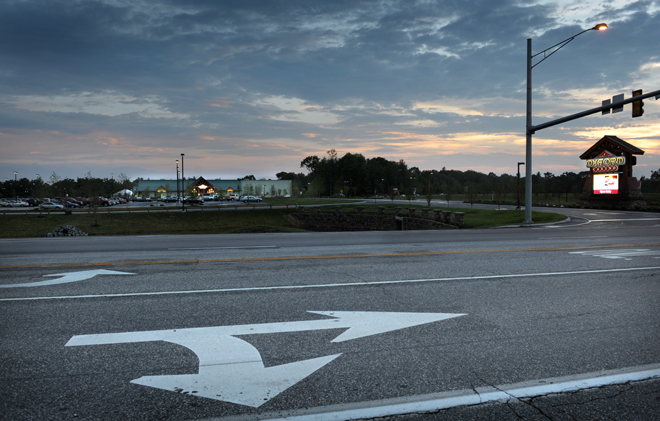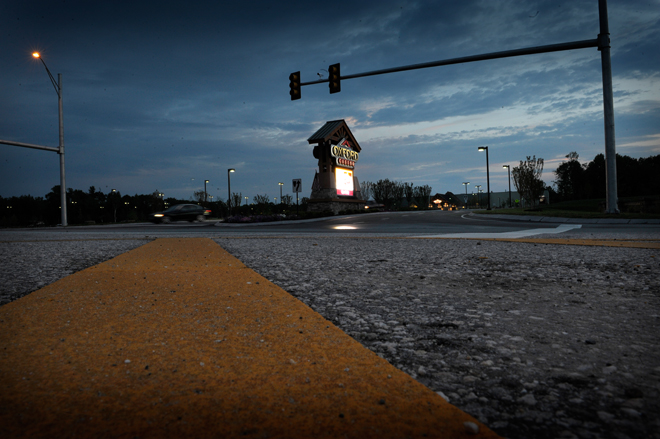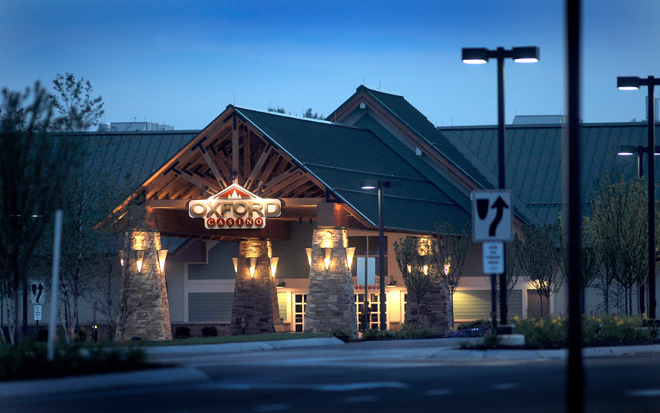The Oxford County Gamble
FEATURE-October 2012
By Jaed Coffin
Photographs by Fred Field
I leave Brunswick about eight in the morning, and after taking a web of back roads through the farms and fields and forests of Pownal and Gray, I turn north on Route 26 just south of Poland and cross the Oxford County line.
At the top of the hill and across the street from a small farm—weathered red barn, silver silos, dusty pasture—the wooden posts of the Oxford Casino sign rise out of the pasture like a monolith. Beyond the sign, a vast green metal roof sparkles in the morning light. There are no windows—standard casino design—and there are no flashing lights or blinking billboards, no gaudy castle turrets or even a scale model of the Eiffel Tower rising out of a corn field. I had driven past the other casino in Maine—Hollywood Casino in Bangor—and half-admired the grand ambition of the fortress-like walls, the Jazz Age signage, the glassy implication that something really important was happening inside. But the new Oxford Casino, which has been open for about five weeks, doesn’t look much bigger than a Wal-Mart. On the other hand, the parking lot is half full and it isn’t even 9 a.m.
And so I keep driving, on the good faith that whatever story might be hiding within those walls is probably not that different than the story I had been following in the papers for the last few years. Back then, the question of whether or not Mainers wanted the Oxford Casino wasn’t entirely about jobs, dollars, or potential traffic jams on Route 26. Rather, the casino question seemed to tap into every other divisive issue I’ve witnessed in the three decades that I’ve lived here. It was a vote that, for the millionth time, pitted our struggling state economy and our libertarian fiscal values against our sometimes foggy and sometimes crystal-clear moral compasses. When the dust settled in November 2010, the outcome of the casino vote—statewide, the vote in favor of the casino passed by less than one percent, while county-wide it passed by almost 23 percent—had asked a lot of us to reconsider who, in 2012, we wanted to be.
En route to Norway: the defunct Burlington Homes manufacturing plant, a rusted out snow-tubing center, Mainely Puppies pet store and Mainely Auto car sales, Pa’s Trading Company, an outdoor flea market, the Call of the Wild RV Center sales lot, an adult-video shop called the First Amendment, several modern churches, turnoffs for summer camps, and the Oxford Plains Speedway that rises from the flats like a derelict temple, and where, three days earlier, 14,000 fans watched 23-year-old Joey Polewarczyk race his way to the $45,000 winner’s purse of the TD Bank 250. I don’t stop driving until I get to the Cottage Barber Shop on Main Street in Norway, where Merry Geisler is giving a free haircut to George Andrews for his 102nd birthday. Hanging over the mirror is a wooden sign commemorating the Titanic; to the right is another sign that reads: “If you are fortunate enough to be bald, your haircut is eight dollars.”
And there it is again: the Maine universal in the barbershop particular. The ghost of a sunken ship opposite a clever proclamation of Yankee resourcefulness.
George Andrews hasn’t been to the casino yet. Neither has Merry Geisler or any of the other three men in the Cottage Barber Shop.
“Most of us just don’t have time,” one gentleman says. Another man says, “I’d like to. Maybe one of these days.”
I figure Andrews, as a man who was born in Augusta but who has been a resident of Norway since 1935, might give me the long view. In his younger years, Andrews owned a small oil company. “Used to shovel coal into people’s driveways, move their furniture, their pianos. A little of everything,” he tells me. Back then, Andrews remembers that most people in Oxford County had jobs. “The guys worked in wood, masonry, building. The old shoe factories used to help a lot of people, but then they just went defunct. I don’t know what happened. About the ’70s and ’80s, it just slowly went downhill.”
This is an admirable crying of wolf: mills can close, work can dry up, and yet, for a man like Andrews—even after a century of fighting the good fight and sometimes losing—it’s still not a good enough reason to go anywhere else.
“I love Maine,” Andrews tells me. “It’s a great state. I wouldn’t live anywhere else. I’d love to see it all change for the better. But this new area,” Andrews says, his gaze settling, “is needing jobs badly.”
So I ask him if the new casino is part of the solution. He exhales slowly, searching the room for input and finally shrugs. “I don’t think it’s a healthy addition to the community,” Andrews says. “It isn’t all honey and jam. But,” he says almost instinctively, “I won’t say it shouldn’t be there.”
I’ve met this tricky pair of values before: the clear moral conviction coexisting with the stubborn belief in individual freedom. And, hanging between the two poles like a pendulum, the need for jobs.
A few doors down on Main Street, I get mostly the same song from Chester Jones at the Days Gone By antique shop. Jones is happy to tell me that he voted in favor of the casino, especially after he felt that people were getting too vocal in opposition to it. “It’s their money,” Jones says, referring to Black Bear Entertainment, the firm which, in conjunction with Las Vegas–based Silverton Casino, is behind the Oxford project. “They should be able to do what they want with it.” Then Jones tells me that his niece, a recent college graduate, has a part-time job at the casino training employees. “She makes good money,” he says.
But I know how Mainers usually think: we’re sensible on the surface, but it’s not all pragmatics. So I push him a little. Has the casino brought more customers into Days Gone By?
Jones laughs and shakes his head. “They come up here to play cards,” he says. On the topic of cards, Jones tells me that since the casino opened, he’s stopped playing cards altogether. For the last several years, Jones played poker with a group of friends on Friday nights. “Now,” he says shrugging, “they’re all at the casino.”
For the next several hours, I wander around Oxford and Paris and Norway, checking in with locals about how, in the last month, their lives have changed. Cathy Wai, owner of Mayflower Chinese Restaurant, has noticed a decline in business since the casino opened in June, but isn’t sure that the casino has anything do with it. She voted for the casino and went there not long after it opened. Anne Mallory, owner of Creative Media—a savvy business space full of copy machines that, on weekends, somehow morphs into Tucker’s Music Pub—is grateful for the casino, since she does a lot of the printing work for Black Bear Entertainment. She also tells me that Lakeside Awards, a trophy business down the street, did the nametags for the employees. Kryste Skye, eating lunch at Cafe Nomad with her daughter, is a therapist who moved to Oxford County from Connecticut 24 years ago because she “wanted something more rural.” Until June, she had never seen a patient with a gambling addiction. Now, she’s seen two.
It’s easy to lose faith in a story like this. When people tell you what you already think is true—that there are pluses and minuses to both sides of an issue, that it’s still too early to know whether or not the casino is helping or hurting Oxford County—it’s kind of like washing the salt off your car in January: it’s all bright and sparkly for a moment until you get back on the road. But as I head south on Route 26, I get this strange feeling about a roadside restaurant where a large plastic sign advertises “Senior Discount on Tuesday” and “Help Wanted P/T Cook.” In the parking lot next to the sign, under a grove of trees, carefully arranged rocks spell out the restaurant’s name: Simply Eats.
In the dining room, three senior couples sit at booths, speaking quietly over burgers and chips, gazing out the windows. The owner of Simply Eats, Jessica Richardson—blonde, bright, earnest, and dignified—zips out from behind the counter with a menu. I tell her that I’m not here to eat. She smiles mildly, and says she is happy to talk.
Richardson has lived in Oxford County her whole life, and all of her family still lives here. She knows her customers by first name. Her restaurant employs seven people; one of them is a 2010 Oxford Hills graduate named Frankie Severance who, recently discharged from the Army after being diagnosed with pancreatic cancer, lives in the apartment upstairs. Hanging on the walls of the Simply Eats dining room are several mantra-like signs that read “Live Simply,” which Richardson has collected in the year since she rescued the restaurant after the previous owners were forced to close. Richardson recalls in the early days of casino planning that six to eight men from Black Bear Entertainment used to come into Simply Eats, sit down with binders and folders, and talk plans. “But I haven’t seen them since,” she says.
I ask Richardson whether or not in the last month she has noticed any changes in the community that raised her because, for some reason that I can’t really articulate, there’s something about Richardson that sparkles with the ineffable spirit of this place. She’s hardworking, she’s taking a financial risk, and yet, from what I can see, her first priority is to serve the people of her community.
“We’ll see how it goes,” Richardson says, her lips pursed, her expression reflective. “People here are feeling very reserved right now. Worried about oil for the winter, worried about bills. I thought I’d get some more customers. More than what we have now. Most people don’t want to come up this far.”
By far, Richardson means the 7.4 miles of Route 26 that stand between the casino entrance and her restaurant. “As a girl, I never thought in a million years that I’d see a casino in this town. Sometimes I drive by to see how it’s doing. But I just wonder: Do those people know about us? Do they think about us? That we’re a family-owned restaurant? That we’re here?”
“I don’t know why I stay,” Richardson says. “It’s sad. But I can’t imagine being anywhere else. Around here, I guess you take what you can get.”
In Richardson’s voice, I hear echoes of George Andrews: the recognition of desperation laced with proud devotion.
On my way out the door, Richardson tries to offer me a free drink from the soda fountain. For professional reasons, I have to refuse.
That evening, driving south on 26 in dusky light, I cross the Oxford County line without even noticing that I had passed the casino. I’m still thinking of the people I met that afternoon—those who, juggling pros and cons, practical concerns and personal virtues, were all just trying to get through another proverbial Maine winter. There were the tradesmen in the Trolley Bar, who, after bragging about their big nights at Oxford Casino, toasted the new business unanimously. Matt Perkins, the bartender, even rattled off the names of ten women who had gotten jobs there and who, he said, “are loving it.” “We’re all excited,” Perkins says. “Something new and different for us to do.”
But even after I get back to Brunswick, I’m still thinking of what Jessica Richardson and George Andrews told me a few hours ago: that despite the stress in their communities, despite the complexity of the problems and the dubiousness of the solutions, neither of them could ever imagine living anywhere else. For them, it was never about the casino.









